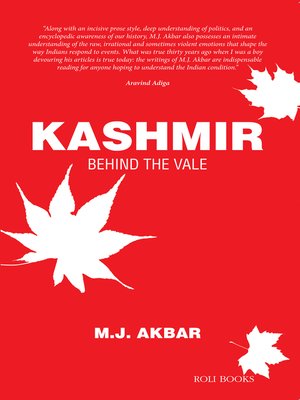
Sign up to save your library
With an OverDrive account, you can save your favorite libraries for at-a-glance information about availability. Find out more about OverDrive accounts.
Find this title in Libby, the library reading app by OverDrive.



Search for a digital library with this title
Title found at these libraries:
| Library Name | Distance |
|---|---|
| Loading... |
MJ Akbar is among those who have made a significant impact on Indian society by their writing, whether as authors or editors. Founder and Editor-in-Chief of the seminal newsmagazine, Sunday, in 1976 and The Telegraph in 1982, he revolutionized Indian journalism in the 1970s and 80s. In the 1990s he launched The Asian Age, a multi-edition daily that once again had substantive impact on the profession. He has also served as the Editorial Director of India Today, Headlines Today and as the editor of the Deccan Chronicle and the Sunday Guardian. MJ, as he is popularly known, first entered public life in 1989, when he was elected to the Lok Sabha. He went back to media in 1993 and returned to the political area in 2014, when he joined the Bharatiya Janata Party (BJP) and became the party's national spokesperson during the 2014 campaign led by Prime Minister Narendra Modi. In July 2016, he was named the Minister of State for External Affairs by Prime Minister Modi.
His seven books have achieved great international acclaim: India: The Siege Within; Nehru: The Making of India; Riot-after-Riot; Kashmir: Behind the Vale; The Shade of Swords: Jihad and the Conflict between Islam and Christianity, Tinderbox: The Past and Future of Pakistan and Blood Brothers, his only work of fiction. In addition, there have been four collections of his columns, reportage and essays.|Kashmir lies at the edge of India's borders and at the heart of India's consciousness. It is not geography that is the issue; Kashmir also guards the frontiers of ideology. If there was a glow of hope in the deepening shadows of a bitter Partition, then it was Kashmir, whose people consciously rejected the false patriotism of fundamentalism and made common cause with secular India instead of theocratic Pakistan. Kashmir was, as Sheikh Abdullah said and Jawaharlal Nehru believed, a stabilising force for India. Why has that harmony disintegrated? Why has the promise been stained by the blood of rebellion? M.J. Akbar, the celebrated author of India: The Siege Within, Nehru: The Making of India, Riot After Riot and The Shade of Swords: Jihad and the Conflict between Islam and Christianity delves deep into the past for the roots of Kashmiriyat, the identity and culture that has blossomed within the ring of mountains for thousands of years. He records Kashmir's struggle in the century to first free itself from feudal oppression and then enter the world of modern India in 1947. Placing the mistakes and triumphs of those early, formative years in the perspective of history, the author goes on to explain how the 1980s have opened the way for Kashmir's hitherto marginalized secessionists. Both victory and defeat have their lessons; to forget either is to destablize the future. Kashmir and the mother country are inextricably linked. India cannot afford to be defeated in her Kashmir.







